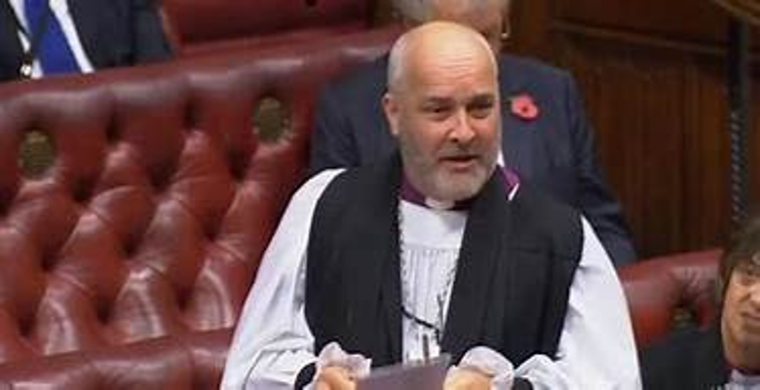The CofE's second-in-command who doesn't understand Christianity
By Campbell Campbell-Jack
THE CONSERVATIVE WOMAN
https://conservativewoman.co.uk/
July 9, 2020
One of Britain's leading progressive Christians, Stephen Cottrell, is to be enthroned Thursday (July 9) as 98th Archbishop of York, the Church of England's second highest position. Let's have a look at him.
Archbishop of Canterbury Justin Welby describes Cottrell as 'one of the most inspiring leaders in the church. He preaches, he writes beautifully, he writes poetry, he thinks very deeply, he communicates superbly'. One would think from this that Cottrell was an aesthetic and intellectual paragon.
Cottrell may write beautifully and poetically; he also uses abusive and intemperate language when speaking to clergy under him. In the Times, Cottrell is described as 'a liberal moderniser who peppers his talks to his clergy with phrases such as "what the bloody hell" and "who gives a toss?"' Cottrell's use of disdainful language in a manner liable to delight the trendy but offend the faithful reveals the inner man's attitudes.
Following the gender transitioning of a pupil at a C of E primary school in his previous diocese of Chelmsford, there have been claims that Cottrell told diocesan ministers holding biblical views on sexuality they 'could leave'. Cottrell has denied saying this, yet four conservative clergy have resigned from the diocese.
Don't be awed by the progressive theology. It can seem daunting: like other post-modern thought it appears impenetrable. However, we need only examine the adherents' public statements for the theological incompetence to become apparent. Cottrell's shooting from the hip lands him, like other progressive Christians, in the quagmire.
The ability to think deeply and communicate his thoughts is a requirement of a church leader, but even more important is the content of what he communicates. Cottrell's plain public statements indicate that this leading progressive has little idea of how dangerous his obvious desire to be acceptable to the secular world is to the church at large.
Progressives love to be at the cutting edge of social thinking, but whilst gaining approval from the secular world this invariably leads them into theological chaos. Cottrell says he wants to stand alongside and celebrate Black Lives Matter and is in no doubt that Jesus would have joined their protests, since 'Jesus was a black man and he was born in an occupied country'. This single sentence reveals a frightening lack of theological understanding and serious deficiency of biblical knowledge.
Leaving aside the dubious assertion that Jesus was a black man, we must question that He would find His core identity in His skin colour. When the Word became flesh at the Incarnation it was humanity in its totality that was assumed, not any single fractional aspect of that humanity. This has been understood since the 4th century when Gregory of Nazianzen said: 'The unassumed is the unredeemed'.
Stephen Cottrell's race-based understanding of Jesus leaves the door wide open to racial interpretations of Scripture of the kind propagated by by the theologians of apartheid.
Progressives invariably discount the Bible or display ignorance of it and Cottrell is no exception. It may surprise the new archbishop, but in the Sermon on the Mount Jesus directly addressed the issue of how to behave when oppressed by occupying military forces. A Roman soldier could order a Jew to carry his pack for a mile, and the Jew would be forced to comply. This was not to make up a deficiency in porters, it was to display the control of the occupiers over the colonised and their contempt for the defeated.
If ever there was a situation crying out for redress it is here. Did Jesus advise His followers that when in such a position they should refuse, demonstrate or call for the Roman army to be defunded? The response Jesus teaches is the diametrical opposite of BLM. In a truly radical response demonstrating that the intended offence was not even acknowledged, Jesus said His followers should confound the oppressor by carrying the pack not just for a mile but for an extra mile.
Loving, praying for, and forgiving one's enemy is at the core of Jesus's teaching about the Christian life. In playing to the progressive gallery Cottrell shows himself oblivious to the truly radical nature of Christ's teaching.
What is the church's greatest challenge today: could it be evangelism, dwindling influence, biblical ignorance? No, according to Cottrell, 'learning how to live sustainably on this earth is the greatest challenge of all'. Church leaders should be in touch with social concerns and be prepared to address them, but their task is to lead the church in radical discipleship, not to mirror surrounding society.
Biblical Christians are often challenged as to whether our behaviour measures up to our message, and rightly so. When biblical Christians say one thing and then act in a manner contradicting their message, their hypocrisy gives others an opening to reject the gospel. Stephen Cottrell is on record as making statements in line with progressive ideology, but we should question his personal commitment to those values.
On several occasions Cottrell has indicated that he believes the C of E is institutionally racist and stated his determination to change that: 'The leadership of the Church of England is still too white, and I hope under my watch we'll see further changes on that.' Yet he gladly becomes another white man replacing a black man, John Sentamu, in one of the top jobs in his denomination.
The Times reports: 'He is a vocal supporter . . . of same-sex relationships.' Yet without a murmur of protest or hesitation he replaced the homosexual priest Jeffrey John as Bishop of Reading in 2004 after John was pressured to step down by Rowan Williams, then Archbishop of Canterbury.
Does he say one thing and then do another? From his actions it is apparent that Cottrell is not a man to allow his principles to get in the way of promotion.














